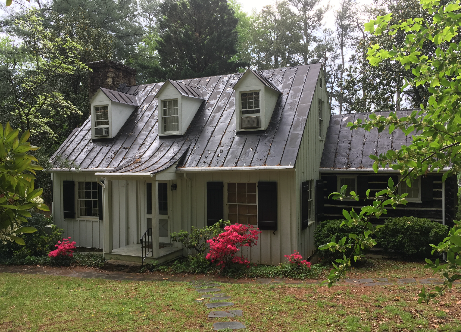By Erika Howsare
Most of us have experienced some degree of cabin fever during the past year. As we near the anniversary of the dramatic upheaval brought on by the pandemic, we look back on a full 12 months lived much closer to home than many folks are used to. At the same time, spring is coming. How can we safely stretch our wings?
Hopping a plane to the usual spring-break destinations is not the smartest idea right now. Neither is road-tripping, unless you have an RV or another way to avoid public restrooms and hotel stays. For the COVID-cautious traveler, renting a standalone cabin or cottage might be your best bet. The only caveat is, as with RVs and campgrounds themselves, demand for such rentals is high. Be prepared to plan ahead.
We’re lucky to have an excellent state park system in Virginia, and many of our parks offer lodgings. Some of these are as comfortable as your average suburban home. James River State Park, for example, has 16 modern cabins (from $129) with board-and-batten siding, fireplaces, big porches and decks, and conveniences from microwaves to air conditioning.
At Belle Isle State Park, the Bel Air “mansion” (a slight exaggeration, though the 1942 Colonial-style home is certainly lovely) and a smaller guesthouse offer refined stays near the Rappahannock River. And Hungry Mother State Park in Marion offers 20 cabins starting at $84, some of which were log-built by the Civilian Conservation Corps during the Great Depression. Though these retain their rustic character, they don’t ask you to give up any of the conveniences of home (except TV—but hey, isn’t this supposed to be a getaway?).
A total of 25 state parks contain cabins, and some provide more unusual lodgings. Check out the yurts at places like Lake Anna State Park and First Landing State Park (from $75). Think of the yurt as a big, sturdy tent—it offers no electricity or running water, nor cooking facilities, so plan on cooking or grilling outdoors. In the warm months, other parks, like Westmoreland State Park near the mouth of the Potomac, rent “camping cabins” starting at $47—electrified but not heated or cooled, and lacking kitchens and bathrooms.
A somewhat clunky reservation system at virginiastateparks.reserveamerica.com is the way to secure your state park cabin—and you’ll have to work around some COVID restrictions, like 24-hour rest periods between visitors. During the pandemic, the parks aren’t providing linens as they usually do. Go anyway; it’s worth it.
Our backyard national park, Shenandoah, is another great option, with two rather different sets of cabins starting at $135. Lewis Mountain cabins are off Skyline Drive in the upper elevations of the park. They offer comfy bedrooms and bathrooms, outdoor cooking areas, heat and electricity. Shenandoah River cabins are down in the valley, right on the waterfront, and more luxurious—each one has a hot tub, even the Vintage River Cabin that dates back to the 1700s. Jockey for reservations at nationalparkreservations.com.
There’s another way to experience cabin life in Shenandoah and other areas, if you’re not afraid to go primitive. The Potomac Appalachian Trail Club maintains 42 cabins, in an area stretching from the southern end of Shenandoah up into Pennsylvania. While some do have modern amenities, most are free of electricity, heated by wood stoves, and—in some cases—reachable only on foot, with your gear on your back.
The closest of these to Charlottesville (besides one called Dunlodge that’s actually located right here in town) is called Doyles River ($45), and it’s less than half a mile off the Appalachian Trail. It’s primitive and, like some of the state park cabins, was built by the CCC. There are other PATC cabins in and around Shenandoah—like the Argow Cabin ($55), boasting big mountain views—and the Vining Cabin ($100), with electricity inside and solar panels on the roof. But Doyles River is one of the select PATC cabins that doesn’t require you to buy a $40 annual membership.
Read more, and link to the reservation system, at patc.net. But note: The pandemic has restricted PATC cabin rentals to weekends, and all stays have a two-night minimum.
Of course, in the age of Airbnb, we’d be remiss not to point out that there are scores of privately owned rentals scattered throughout the land, representing all manner of styles, price ranges, and quirky amenities. A few that invite a second look: an $84-a-night treehouse in Sandston, just east of Richmond, which has a hot tub, a fire pit, and a cute loft-type bed reached by a ladder. Or a sleek, modern shipping-container house in Forest, near Lynchburg, can be yours for $145 per night. Down in Farmville, a cottage on a goat farm goes for $114 a night. (Baby goats just born on February 8, says the listing!)
You may not need to stray very far at all to find an escape. Six miles from downtown Charlottesville is a $125-a-night “Tiny Tree Cottage,” essentially a tiny house with rustic detailing and a roof deck featuring hammock swings. For almost anyone, that sounds like a real change of pace.




